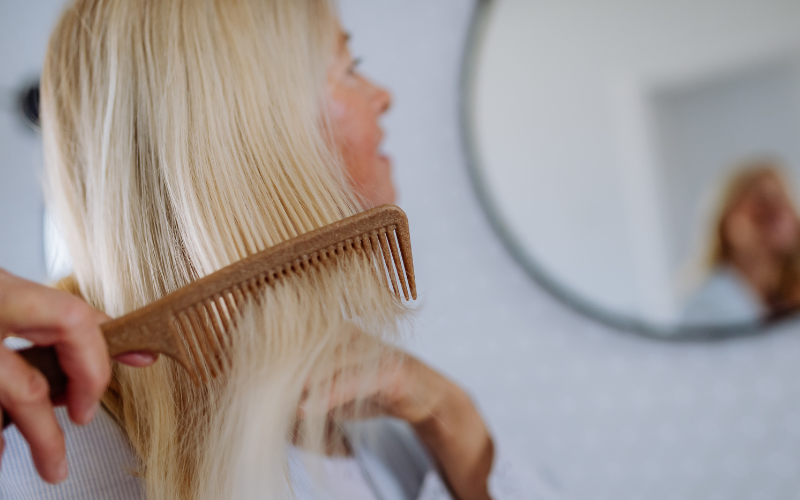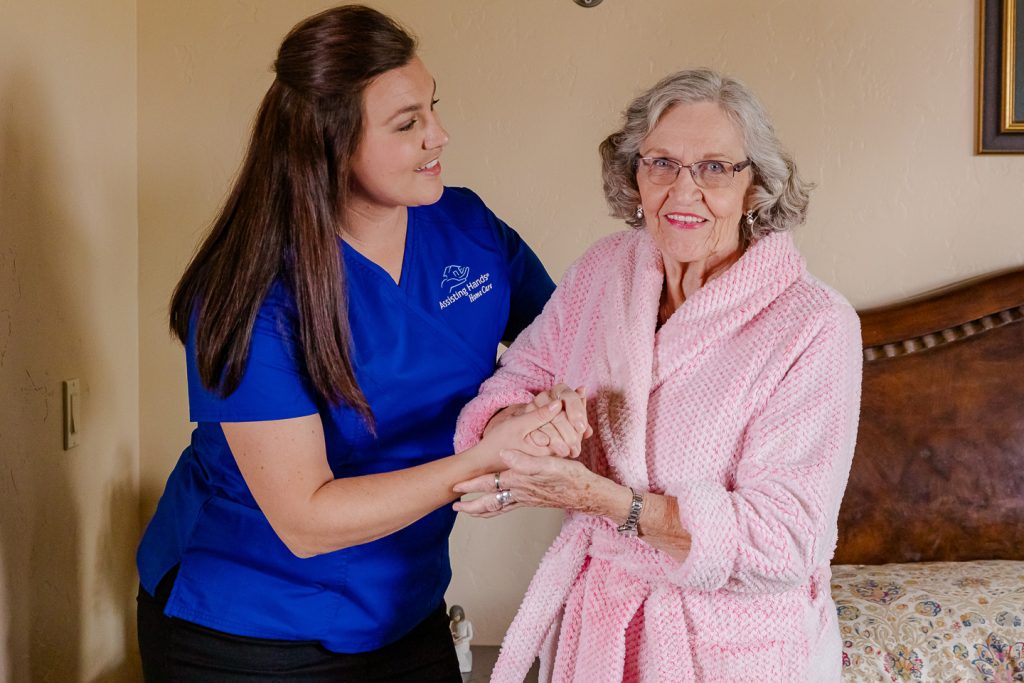
As older people age, independently performing activities of daily living (ADLs) can become increasingly challenging. Showering, shaving, toileting, and dressing may require the assistance of a family member or professional caregiver. If you have a senior loved one who needs your help, it is important to understand the basics of grooming for an elderly loved one.
Firstly, it is important to discuss the senior’s comfort level before helping with personal hygiene tasks. An elderly individual may feel embarrassed or humiliated being bathed by a family member. A professional caregiver, however, is more likely to be successful in convincing a senior to bathe.
Grooming tasks are personal in nature and ensuring the senior’s comfort is paramount. An unskilled approach can be stressful for the senior and fails to increase trust and comfort. Answers to specific questions can relieve the level of discomfort and promote a positive experience.
A caregiver may ask whether the senior prefers a family member or a professional caregiver to provide assistance. Determine the specific tasks in which your elderly loved one needs help. Find out if showering is more comfortable with support from a person of the same or opposite gender.
Seniors thrive in daily routines. Caregivers are encouraged to follow the care recipient’s established schedule, which may be bathing in the mornings or afternoons. Resistance is less likely when the senior knows what to expect each day. Grooming products should remain consistent, too.
1. Bathing Once or Twice a Week
Bathing every day is unnecessary unless the senior has a medical condition or infection that requires daily cleansing. In fact, most seniors maintain adequate hygiene by bathing once or twice per week. When incontinence issues arise, bathing frequently is advised to prevent skin breakdown.
Showering aids are critical to help seniors maintain balance and avoid falls on the slick bathroom tiles. Install grab bars near the toilet and in the shower. A senior who tires easily during bathing will benefit from a shower stool or bath bench. Stick nonslip adhesives to the shower floor.
Skin care in the elderly should be handled delicately. Aging skin is sensitive, so caregivers are advised to pat instead of rub the skin with a towel. Run warm rather than hot water in the shower. Limit showers or baths to 10 minutes. A soft cloth is ideal for washing.
Soft cloths serve a twofold purpose. While soapy cloths may be used for cleansing, the senior may also hold cloths over private areas to feel less exposed. Dry towels are necessary to whisk away moisture from under skin folds and prevent a fungal infection.
Improve comfort during bath time by playing soothing music and dimming the lights. A warm bathroom is more inviting than a cold one. A back rub or leg massage may also provide ease. Caregivers who refer to baths as “spa time” are more likely to persuade the senior to bathe.
2. Daily Oral Hygiene
Aside from visiting the dentist every six months (or more, if a medical condition is present), seniors must maintain dental hygiene on a daily basis. Practice oral hygiene twice daily, in the mornings and evenings. Check dentures periodically to ensure a proper fit. Inspect gums for gum disease or cancer.
A senior may have the ability to independently maneuver a toothbrush. A caregiver, however, may prepare the toothbrush by adding a high-fluoride toothpaste to the bristles. Or, if the senior is unable to manage, the caregiver may use an electric toothbrush to brush the individual’s teeth.
3. Dressing Comfortably
A caregiver is also helpful with the task of dressing. Seniors affected with dementia may choose clothes that are inappropriate for the weather. A caregiver may step in and lay out proper clothes in the order in which they should be worn (undergarments, pants, shirt, and sweater).
Encourage independence during dressing for as long as possible. An experienced caregiver will give step-by-step instructions to help the senior dress. When the elderly individual wants to wear the same outfit daily, accommodate the wish by purchasing identical sets of clothing.
Loose-fitting pants with elastic bands are more comfortable for seniors and facilitate ease during bathroom trips. Tight socks and high heels are discouraged. Slip-on shoes and those with Velcro straps are safer footwear. Choose clothing items with zipper pulls instead of buckles and buttons.
4. Shaving and Haircuts
Caregivers are advised to encourage male care recipients to shave. Choose an electric razor to maximize safety. Trim and clean nails regularly. Seniors are likely to enjoy a trip to the barber shop or salon. Some stylists or barbers will offer to perform their services at the senior’s home.
5. Toileting
Toileting is typically a very private task which makes it difficult for some seniors to accept help. However, assistance with toileting is crucial as seniors affected by incontinence are more likely to experience skin issues of infections such as urinary tract infections.
Caregivers must assist seniors affected by incontinence with toileting to prevent accidents and help them change as soon as an accident occurs to prevent skin issues and infections. Make sure you explain everything you are about to do to avoid catching the senior off guard and let them do as much as they can safely handle to ensure their comfort.
6. Fingernails and Toenails
Keeping fingernails and toenails clipped and clean is an important part of hygiene that cannot be overlooked. Overgrown nails get dirty and if the senior scratches an itch with a long dirty nail, there is a risk of infection.
Make sure to clip the fingernails and toenails of your elderly loved ones regularly. Ask them if they would prefer that you use nail clippers or a nail file to ensure their comfort. You can also bring them to get manicures and pedicures to make it a fun event.
Personal Care from Assisting Hands

Grooming is a private matter. When you are unable to help an elderly loved one groom on a daily basis, seek out the reliable support of a professional caregiver from Assisting Hands Home Care. Our caregivers are both skilled and experienced in helping seniors maintain excellent daily hygiene.
Assisting Hands Home Care caregivers are discreet in providing personal hygiene assistance. We are also respectful in our approach, taking care to ensure the senior is comfortable at all times. Families may choose one caregiver, so that a trusting relationship develops between caregiver and care recipient.
Our home care agency offers more than compassionate assistance with grooming tasks. We also provide a range of non-medical senior care services in the comfort of home, such as transportation to doctor’s offices, grocery shopping, meal preparation, light housekeeping, companionship, and overall care management.
Care services are flexible and may be adjusted as care needs change. When short-term care is necessary, choose our dependable respite care services. We also provide live-in care, 24-hour care and post-surgical care. During the final stages of life, families turn to our quality hospice care services.
Families with seniors living in the surrounding communities of Glen Ellyn, IL | Warrenville, IL | Naperville, IL | Westmont, IL | Woodridge, IL | Lisle, IL | Wheaton, IL, choose Assisting Hands Home Care for the most comprehensive elder care services. We conduct an in-home assessment to determine care needs and develop a care plan. Call us at (630) 634-9316 when your loved one would benefit from quality home care.















